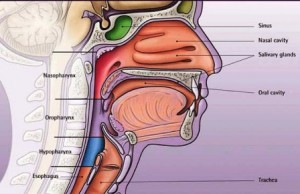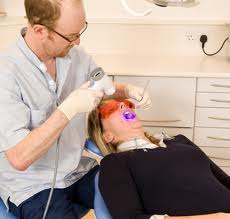
Anyone can get oral cancer, but the risk is higher if you are male, over age 40, chew tobacco or drink alcohol or have a history of head or neck cancer. Frequent sun exposure is also a risk for lip cancer. Symptoms of oral cancer include:
- White or red patches in your mouth.
- A Mouth sore that won’t heal.
- Bleeding in your mouth.
- Loose Teeth.
- Problems or pain with swallowing.
- A Lump in your neck.
- An Earache.

Surgery to remove the tumor : Your surgeon may cut away the tumor and a margin of healthy tissue that surrounds it. Smaller cancers may be removed through minor surgery. Larger tumors may require more-extensive procedures.
• Surgery to remove cancer that has spread to the neck : If cancer cells have spread to the lymph nodes in your neck, your surgeon may recommend a procedure to remove cancerous lymph nodes and related tissue in the neck (neck dissection).
• Surgery to reconstruct the mouth : After anoperation to remove your cancer, your surgeon may recommend reconstructive surgery to restore the appearance of your face or to help you regain the ability to talk and eat.
• Maxillectomy : Maxillectomy is the removal of the hard palate if that is affected. A special denture called prosthesis can alter the defect caused in the hard palate resulting from the surgery. Mouth’s surgery involves removal of thin sections of lip tumors. Immediate examination of the sections for potential cancer cells allows the surgeons to decide whether or not the cancer is completely removed.
• Laryngectomy : Laryngectomy is the surgical removal of larynx (voice box). This is done when there is risk of food entering the trachea and infecting the lungs, as a result of removal of tumors of tongue or oropharynx. By removing the larynx, the trachea is attached to the skin of the neck thus eliminating the risk of infecting the lung and potential pneumonia.
• Neck Dissection : Neck dissection is a surgical procedure involving removal of lymph nodes in the neck that are known to contain cancer cells. The side effects of this surgery include numbness of the ear, difficulty in raising the arm above the head, discomfort to the lower lip—all of which are caused by different nerves involved in the surgery.
• Tracheostomy : Tracheostomy is an incision made in the trachea to facilitate breathing for oral cancer patients who may develop considerable swelling following surgical removal of the tumor in oral cavity. This prevents any obstruction in the throat and allows easy breathing.

Internal radiotherapy : Internal radiotherapy is a type of radiotherapy often used to treat cancers of the tongue that are in their early stages. It involves sticking radioactive wires or needles directly into the tumour while you are under a general anaesthetic (put to sleep). The wires or needles then release a dose of radiation into the tumour.
Chemotherapy : Chemotherapy is often used in combination with radiotherapy when the cancer is widespread, or if it is thought there is a significant risk of the cancer returning.Chemotherapy involves the use of powerful cancer-killing medicines.
To know more about Oral Cancer Treatment in India please visit this link : https://safemedtrip.com/medical-services/cancer-treatment-in-india/oral-cancer-treatment-in-india.html

 Click to WhatsApp
Click to WhatsApp +91-9899993637
+91-9899993637



